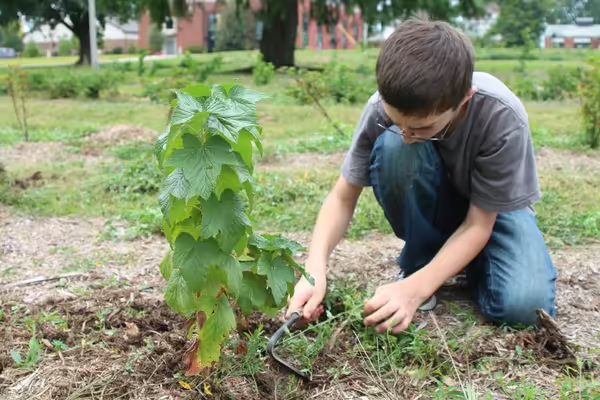
NORMAL, Ill. – The Refuge Food Forest in Normal is an urban demonstration site for the University of Illinois woody perennial polyculture research. U of I Extension partnered with the Town of Normal, the Savanna Institute, and Midwest Agriculture & Restoration Services to create the first urban food forest in an Illinois public park. The food forest, a form of urban agroforestry designed to create a sustainable food production system, integrates a diversity of fruit and nut trees, berries, herbs, and vegetables. The end result is intended to be an edible landscape, largely self-sustaining and open to the public for harvesting.
“The food forest is designed to build community and help people reconnect with the source of their food,” says Extension educator Bill Davison. Last spring some 75 volunteers, ranging from preschoolers to great-grandparents, planted 2,500 fruit trees, shrubs, cane fruits, perennial vegetables, herbs, and native prairie plants. Volunteers continue to maintain and weed the growing forest. The Refuge, named for an orphanage once on the site, is on town-owned property northeast of Illinois State University. The location is accessible from a nearby bike trail and is walking distance of the Mulberry School and Normal Community Activity Center.
“We are thrilled to build on the research and advice of Kevin and others on campus at Illinois,” Davison says. “Based on observations from the Urbana site, we should expect a tremendous increase in the amount of life and ecological services in our food forest in the next two years.” The residents of Normal can also look forward to the textures and flavors of fresh delights, including raspberries, grapes, gooseberries, apples, pears, hazelnuts, and chestnuts.
Illinois Extension leads public outreach for University of Illinois by translating research into action plans that allow Illinois families, businesses, and community leaders to solve problems, make informed decisions, and adapt to changes and opportunities.